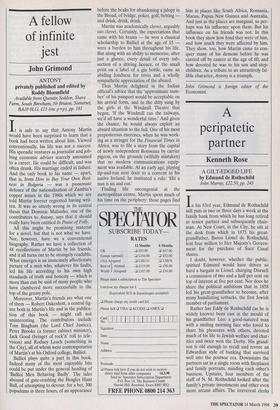A fellow of infinite jest
John Grimond
t is safe to say that Antony Martin would have been surprised to learn that a book had been written about him. Viewed conventionally, his life was not a success. His sporadic ventures as journalist and job- bing economic adviser scarcely amounted to a career. He could be difficult, and was often drunk. His marriage ended in failure. And the only book to his name — apart, that is, from How to Buy Your Own Busi- ness in Bulgaria — was a passionate defence of the nationalisation of Zambia's copper mines in the 1960s which we are told Martin forever regretted having writ- ten. It was so utterly wrong in its central thesis that Dominic Mulaisho, one of the contributors to Antony, says that it should really have been entitled In Praise of Folly. All this might be promising material for a novel, but that is not what we have. Nor, however, have we a conventional biography. Rather we have a collection of 48 recollections of Martin by his friends, and it all turns out to be strangely readable. What emerges is an immensely affectionate picture of a man who, whatever his faults, led his life according to his own high standards of truth and honesty — which is more than can be said of many people who have clambered more successfully to the top of the greasy pole. Moreover, Martin's friends are what one of them — Robert Oakeshott, a central fig- ure both in Martin's life and in the publica- tion of this book — might call not uninteresting. The contributors include Tom Bingham (the Lord Chief Justice), Peter Brooke (a former cabinet minister), Jack Good (bringer of rock'n' roll to tele- vision) and Rodney Leach (something in the City), all of whom were contemporaries of Martin's at his Oxford college, Balliol.
Balliol plays quite a part in this book. Indeed many of the most enjoyable bits could be put under the general heading of `Balliol Men Behaving Badly'. The tales abound of gate-crashing the Beagles Hunt Ball, of attempting to devour, for a bet, 300 popadums in three hours, of an appearance before the beaks for abandoning a jalopy in the Broad, of bridge, poker, golf, betting and drink, drink, drink.
Martin was academically clever, arguably too clever. Certainly, the expectations that came with his brains — he won a classical scholarship to Balliol at the age of 15 were a burden to him throughout his life. But along with an ability to memorise, after just a glance, every detail of every sub- section of a driving licence, or the small print on a label of a gin bottle, came an abiding fondness for trivia and a wholly sympathetic appreciation of the absurd.
Thus Martin delighted in the Indian official's advice that the 'approximate num- ber' of his passport would be acceptable on his arrival form, and in the ditty sung by the girls at the Windmill Theatre that began, 'If the Windmill ran the railways, we'd all have a wonderful time.' And given the chance, he would always exploit an absurd situation to the full. One of his most preposterous exercises, when he was work- ing as a stringer for the Financial Times in Africa, was to file a story from the capital of newly independent Botswana by carrier pigeon, on the grounds (wilfully mistaken) that no modern communications equip- ment was available. At an early age, playing tip-and-run next door to a convent in his native Ireland, he instituted a rule: 'Hit a nun is six and out.'
Finding life uncongenial at the metropolitan centre, Martin spent much of his time on the periphery: these pages find him in places like South Africa, Romania,. Macau, Papua New Guinea and Australia. And just as the places are marginal, so per- haps was his influence upon them. But his influence on his friends was not. In this book they show how fond they were of him, and how much they were affected by him. They show, too, how Martin came to con- quer many of his demons before he was carried off by cancer at the age of 60, and how devoted he was to his son and step- children. As a tribute to an attractively fal- lible character, Antony is a triumph.
John Grimond is foreign editor of the Economist.


































































 Previous page
Previous page